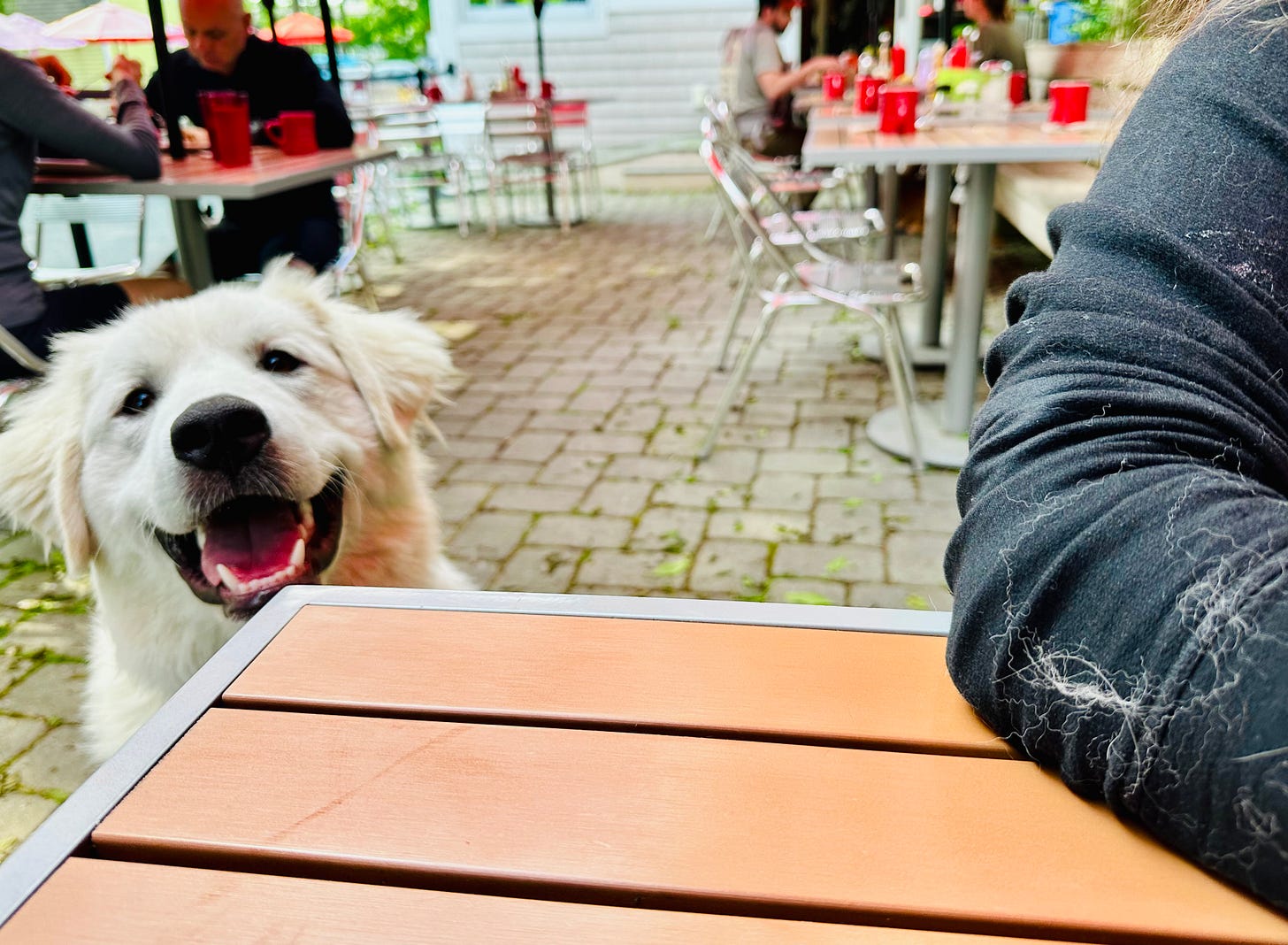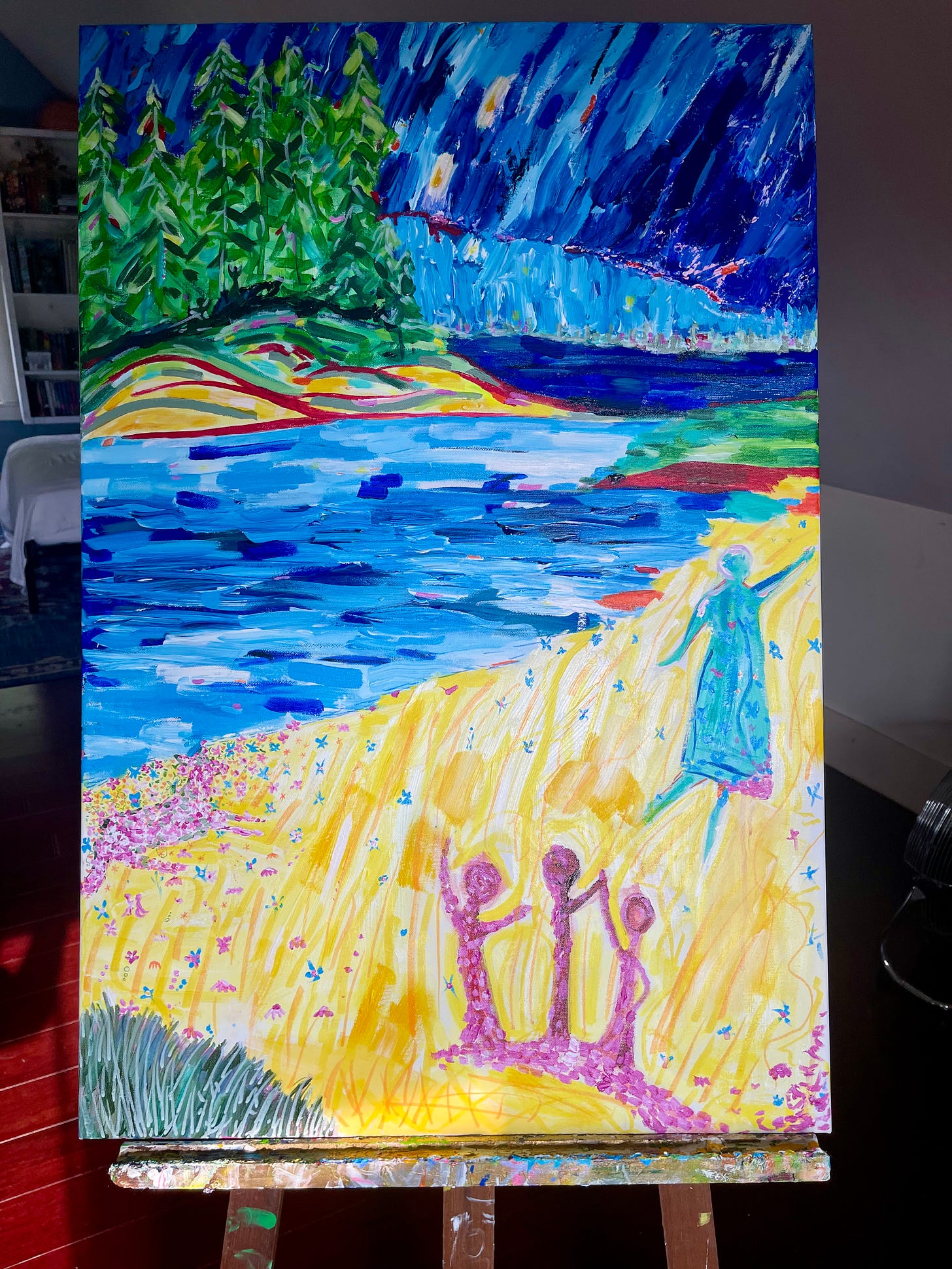
When Em was a kid and we lived in Ellsworth, every weekday morning, we’d pull open the door to the Subaru station wagon, inhale the smell of dog and stale air, and I’m tell Em to hurry.
She’d climb in, slam shut the door—and depending on her mood smile or glower. It was usually a smile. We’d click on our seatbelts, back out of the garage, head up the hill of our driveway and into Ellsworth.
I loved Ellsworth and thought it was beautiful, especially in winter’s first snow when everything was covered with white, when evergreens draped with snow, and it was all of a sudden like driving through a fairy land, a scene from the Nutcracker.
Every weekday morning, Em and I would drive up our dirt road beneath bowing evergreen boughs on our way to school. We’d pass neighbors’ houses. We knew every one by name and birthday.
We’d turn onto the main road where frost and snow and ice and water and wear had heaved up pieces of pavement.
In other places, asphalt buckled under, disappearing beneath the road bed.
You have to know how to swerve if you drive in Maine. You have to know how to look for potholes and frost heaves and deer and be prepared to veer. You also have to look out for your neighbors’ cars doing the same thing.

That’s the other part of reality here.
Even though Maine is beautiful—one of the most beautiful places, I think, in the world, it’s also a place of hidden issues. Papers feature articles about the cost of heating oil. Papers feature articles about the cost of healthcare, maternity units closing, dentists in mobile units to try to get to people, businesses closing, the difficulty to find an affordable and available place to live.
Some families can’t afford oil, so they crank up the thermostats on their stoves, open the oven doors and heat their homes that way.
Others stare and stare at their property tax bills and try to wonder how they’ll pay that, pay their mortgage, how they’ll get their kids to school warm.
We don’t all of us think about that most days when we’re driving on the Surry Road or Eagle Lake Road or Route 102 to get the kids to school. Most of the time we just think about our own worries, about if we will actually get the kiddo to school on time, if that rumble in the car is something major, why the truck smells so funny.
On a good day we might notice how beautiful everything is, how lucky we are to be alive. People will nod hello from their cars. People will let you get onto the road with a wave. Others will smile when they recognize you.
All of this is part of Hancock County, Maine, part of Ellsworth, Bar Harbor, Mount Desert Island, part of our lives.

When I ran for office (and lost) a long time ago, Em and I talked about how that would change the rhythm of our lives, even the car rides to school, the picking up after.
“I can’t believe you’re running,” she’d harrumphed, “but I’m proud of you.”
“Even if I lose?”
“Yep.”
Em was a bright 13-year-old back then who could think herself into circles. She wanted to believe in our country, our government, in our leaders. She wanted to believe in hope, but she was born into a political landscape that was more about hate and the news cycles that promoted that.
It’s hard to believe in hope when vast decisions are turned into sound bites, when real people problems are turned into generalizations and emotional platitudes and soliloquies about us vs them.
Em and the kids after her were born into a time when political consensus between the parties is often like snow on a tree. It’s a beautiful promise of a fairy land and then it fades away, dripping into a puddle that eventually evaporates, maybe undermines a road, making a pothole or frost heave we all have to swerve around.
Sometimes, when it is about to be a local election (like it is here right now), it feels like instead of us all working together to make long-term decisions that will shape our communities a little closer to that beautiful fairy land, it feels like a lot of people worry a bit more about their own political futures than the people they were elected to serve.
Politics in America isn’t meant to be small. It isn’t meant to be petty. It isn’t meant to be trivial. It’s supposed to be about making economic and personal opportunities, about keeping people safe on a lot of levels (health, fire safety, and so many things). It’s supposed to be about protecting each other. It’s supposed to be about making things better.
When I was at a friend’s funeral during that running for office time, a woman stopped me after the service. She was quite tall and I’m . . . Well, I’m not quite tall. She bent a little bit, the wind blowing her gray hair, to make sure I’d hear her, I think.
She clutched her coat around her and said, “I hear you’re running for the state house.”
“Yep.”
People headed into their cars just beyond her. They would all drive as one long line of vehicles to go to the cemetery. They would be separate but joined, headlights on, one car following another following another, noticing where they’d veer to avoid the potholes and frost heaves.
She seemed in no hurry to join them. Instead she eyed me and asked, “What would make you do such a thing?”
I looked at her and said the truth—the real truth—about why I agreed to run when I was asked to. “I was tired of being worried and not being able to do anything about it. I was tired of wringing my hands. There’s no point in that. There’s no point in just worrying. You have to try. I had to try.”
She cocked her head. “Oh.”
“I know people think it’s ridiculous. I just think I can’t not do it.”
“You’re not much of a politician.” She looked me up. She looked me down.
“I know.”
I’m not.
“Well, good for you,” she said. “I’m glad it’s not me.”
We said goodbye; I grabbed my husband and got in the car.
We all get our cars here in rural Maine, most of us do almost every day. We get in our cars and we drive to the same places, over the same potholes, over and over again.
The thing is, though, we are the ones driving the cars. We can choose to go on the same damn trips down the same damn roads, making the same damn potholes. Or we can take detours. We can even try to make the roads better. We can look out for each other when we’re driving because we’re all driving on the same roads.
That’s just how it is.
That’s just what we have to do, too, if want to recreate the politics of our community, of our state, of our country, of our world into something a little closer to what we want it to be. We have to make choices. We have to think about how we veer, how we stay the same, how we fill in the holes, how we build better foundations and surfaces for us all to travel along.
I still think we can do that. Hope? It’s a much lovelier foundation.
QUICK NOTE
I send these emails twice a week. If you would also like to receive them, join the other super-cool, super-smart people who love it today.
*My WRITE BETTER NOW posts also come twice a week if you sign up for them, too, which you should.
I also have a really chill, really quiet Substack here where I post once a week about soup, share someone else’s poem, and something else that feels comforting.




